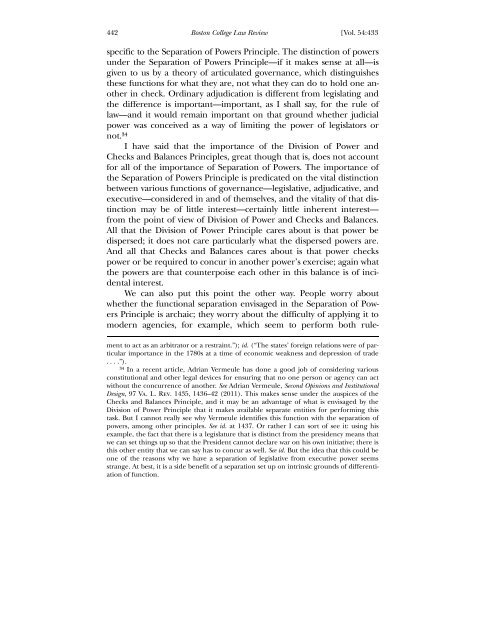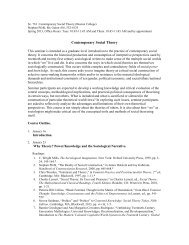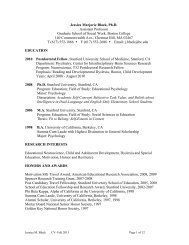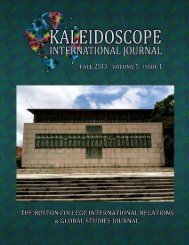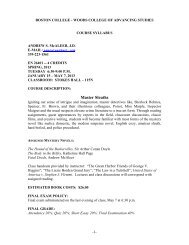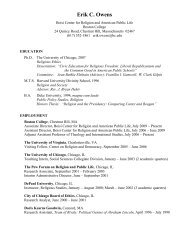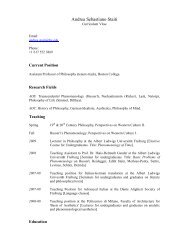separation of powers in thought and practice? - Boston College
separation of powers in thought and practice? - Boston College
separation of powers in thought and practice? - Boston College
Create successful ePaper yourself
Turn your PDF publications into a flip-book with our unique Google optimized e-Paper software.
442 <strong>Boston</strong> <strong>College</strong> Law Review [Vol. 54:433<br />
specific to the Separation <strong>of</strong> Powers Pr<strong>in</strong>ciple. The dist<strong>in</strong>ction <strong>of</strong> <strong>powers</strong><br />
under the Separation <strong>of</strong> Powers Pr<strong>in</strong>ciple—if it makes sense at all—is<br />
given to us by a theory <strong>of</strong> articulated governance, which dist<strong>in</strong>guishes<br />
these functions for what they are, not what they can do to hold one another<br />
<strong>in</strong> check. Ord<strong>in</strong>ary adjudication is different from legislat<strong>in</strong>g <strong>and</strong><br />
the difference is important—important, as I shall say, for the rule <strong>of</strong><br />
law—<strong>and</strong> it would rema<strong>in</strong> important on that ground whether judicial<br />
power was conceived as a way <strong>of</strong> limit<strong>in</strong>g the power <strong>of</strong> legislators or<br />
not.34<br />
I have said that the importance <strong>of</strong> the Division <strong>of</strong> Power <strong>and</strong><br />
Checks <strong>and</strong> Balances Pr<strong>in</strong>ciples, great though that is, does not account<br />
for all <strong>of</strong> the importance <strong>of</strong> Separation <strong>of</strong> Powers. The importance <strong>of</strong><br />
the Separation <strong>of</strong> Powers Pr<strong>in</strong>ciple is predicated on the vital dist<strong>in</strong>ction<br />
between various functions <strong>of</strong> governance—legislative, adjudicative, <strong>and</strong><br />
executive—considered <strong>in</strong> <strong>and</strong> <strong>of</strong> themselves, <strong>and</strong> the vitality <strong>of</strong> that dist<strong>in</strong>ction<br />
may be <strong>of</strong> little <strong>in</strong>terest—certa<strong>in</strong>ly little <strong>in</strong>herent <strong>in</strong>terest—<br />
from the po<strong>in</strong>t <strong>of</strong> view <strong>of</strong> Division <strong>of</strong> Power <strong>and</strong> Checks <strong>and</strong> Balances.<br />
All that the Division <strong>of</strong> Power Pr<strong>in</strong>ciple cares about is that power be<br />
dispersed; it does not care particularly what the dispersed <strong>powers</strong> are.<br />
And all that Checks <strong>and</strong> Balances cares about is that power checks<br />
power or be required to concur <strong>in</strong> another power’s exercise; aga<strong>in</strong> what<br />
the <strong>powers</strong> are that counterpoise each other <strong>in</strong> this balance is <strong>of</strong> <strong>in</strong>cidental<br />
<strong>in</strong>terest.<br />
We can also put this po<strong>in</strong>t the other way. People worry about<br />
whether the functional <strong>separation</strong> envisaged <strong>in</strong> the Separation <strong>of</strong> Powers<br />
Pr<strong>in</strong>ciple is archaic; they worry about the difficulty <strong>of</strong> apply<strong>in</strong>g it to<br />
modern agencies, for example, which seem to perform both rulement<br />
to act as an arbitrator or a restra<strong>in</strong>t.”); id. (“The states’ foreign relations were <strong>of</strong> particular<br />
importance <strong>in</strong> the 1780s at a time <strong>of</strong> economic weakness <strong>and</strong> depression <strong>of</strong> trade<br />
. . . .”).<br />
34 In a recent article, Adrian Vermeule has done a good job <strong>of</strong> consider<strong>in</strong>g various<br />
constitutional <strong>and</strong> other legal devices for ensur<strong>in</strong>g that no one person or agency can act<br />
without the concurrence <strong>of</strong> another. See Adrian Vermeule, Second Op<strong>in</strong>ions <strong>and</strong> Institutional<br />
Design, 97 Va. L. Rev. 1435, 1436–42 (2011). This makes sense under the auspices <strong>of</strong> the<br />
Checks <strong>and</strong> Balances Pr<strong>in</strong>ciple, <strong>and</strong> it may be an advantage <strong>of</strong> what is envisaged by the<br />
Division <strong>of</strong> Power Pr<strong>in</strong>ciple that it makes available separate entities for perform<strong>in</strong>g this<br />
task. But I cannot really see why Vermeule identifies this function with the <strong>separation</strong> <strong>of</strong><br />
<strong>powers</strong>, among other pr<strong>in</strong>ciples. See id. at 1437. Or rather I can sort <strong>of</strong> see it: us<strong>in</strong>g his<br />
example, the fact that there is a legislature that is dist<strong>in</strong>ct from the presidency means that<br />
we can set th<strong>in</strong>gs up so that the President cannot declare war on his own <strong>in</strong>itiative; there is<br />
this other entity that we can say has to concur as well. See id. But the idea that this could be<br />
one <strong>of</strong> the reasons why we have a <strong>separation</strong> <strong>of</strong> legislative from executive power seems<br />
strange. At best, it is a side benefit <strong>of</strong> a <strong>separation</strong> set up on <strong>in</strong>tr<strong>in</strong>sic grounds <strong>of</strong> differentiation<br />
<strong>of</strong> function.


